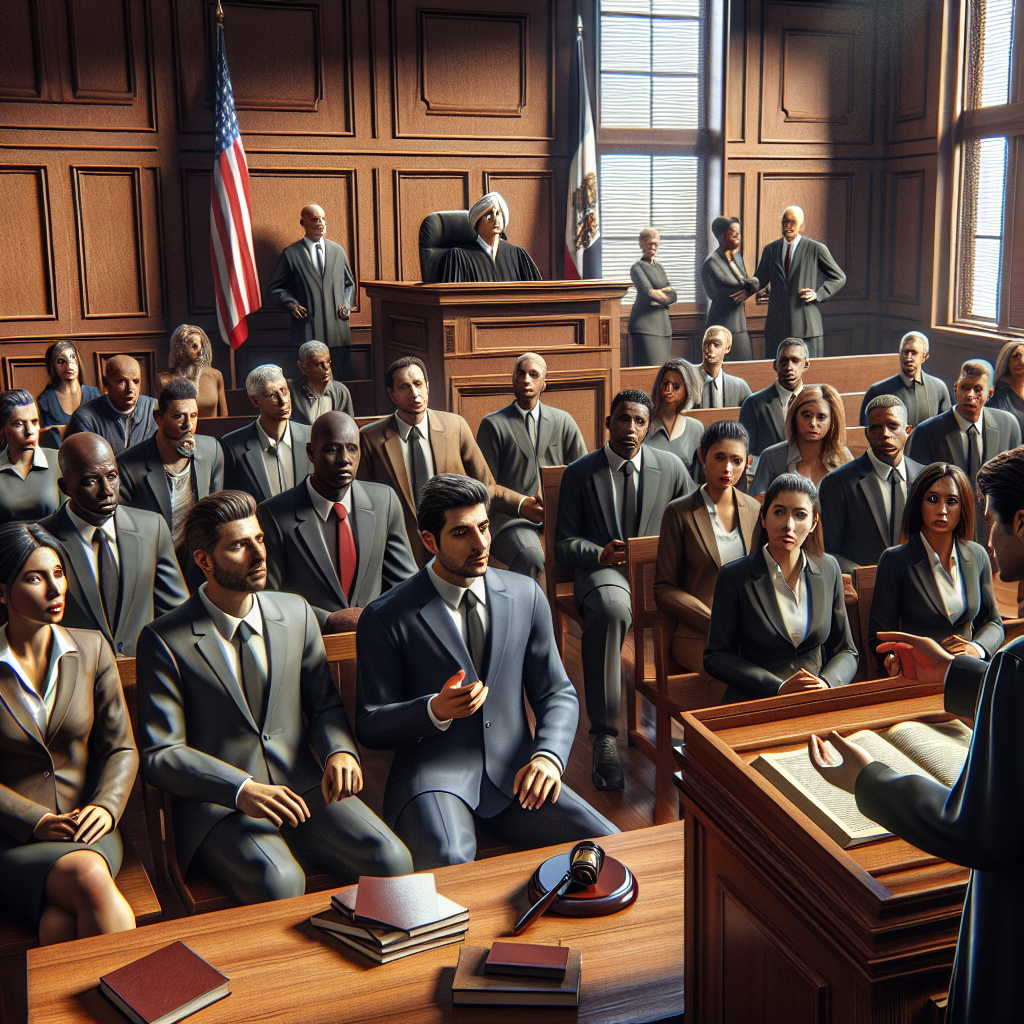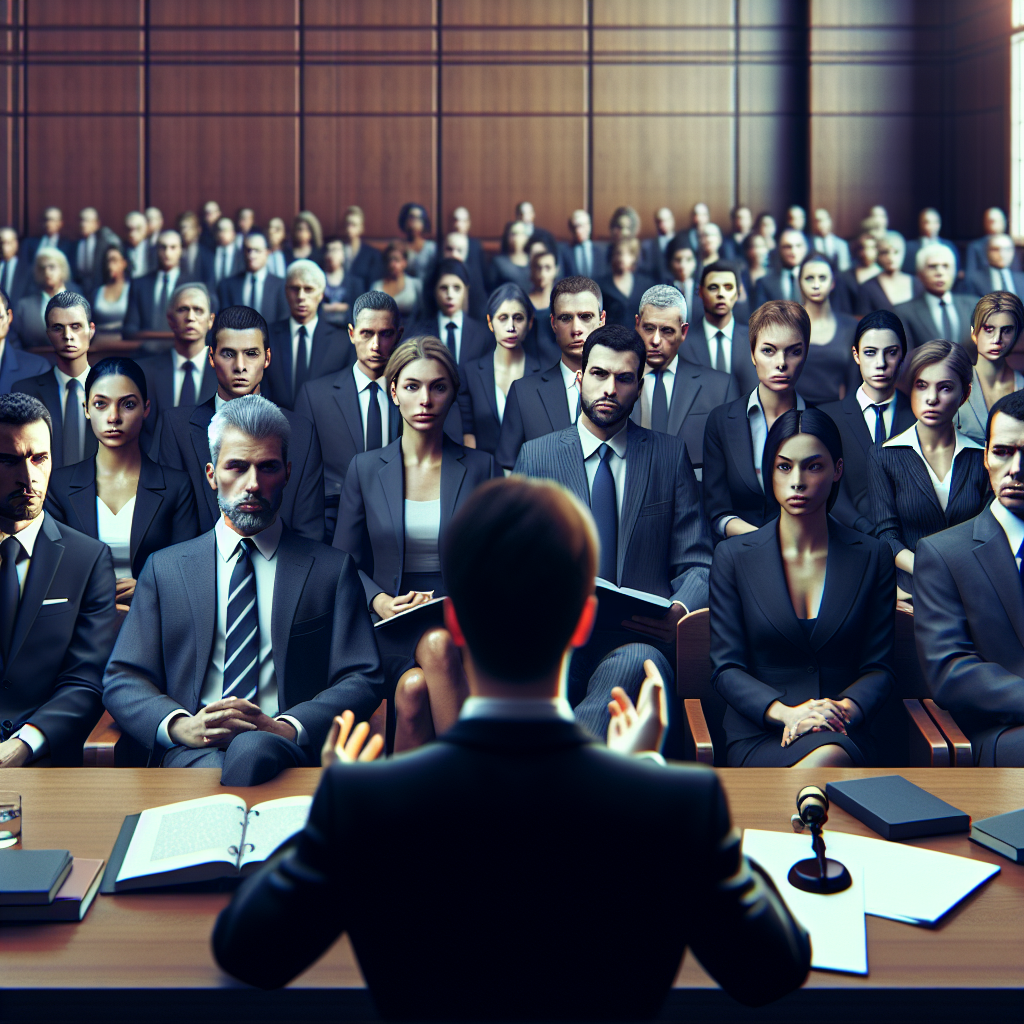Personal Injury Defense: Protecting Your Rights and Interests
Introduction
Welcome to the world of personal injury defense, where the stakes are high and the strategies are as varied as the cases themselves. Whether you’ve found yourself on the receiving end of a personal injury lawsuit or you’re simply curious about how to protect your rights, you’ve come to the right place! Think of this as your trusty guide through a legal maze that can often feel overwhelming.
When it comes to defending against personal injury claims, it’s not just about proving innocence; it’s about navigating a complex landscape filled with legal jargon, courtroom drama, and the occasional surprise plot twist like a courtroom thriller but with less popcorn and more paperwork.
Understanding personal injury defense is crucial for anyone facing allegations of negligence or liability. From auto accidents to slip and fall cases, there’s a plethora of scenarios that can lead to a personal injury lawsuit. And trust me, having a solid defense strategy is like having an umbrella in a rainstorm it won’t stop you from getting wet, but it’ll make sure you don’t drown!
Did you know? The majority of personal injury claims are settled before they ever reach trial. This means that having effective accident claim defense strategies in place can save you time, money, and stress!
In this blog post, we’ll explore everything from the role of a personal injury attorney to key defense strategies that can make or break your case. So buckle up it’s going to be an enlightening ride through the ins and outs of defending against personal injury claims!

Understanding Personal Injury Defense
When the term personal injury defense pops up, it’s like saying “chocolate cake” at a party everyone’s ears perk up! But what does it really mean? In the legal world, personal injury defense is all about protecting the rights of individuals or entities accused of causing harm. Think of it as a legal shield against claims that could potentially lead to hefty damages or compensation payouts.
Injuries can occur in various scenarios from slip and fall incidents to car accidents and even workplace mishaps. When someone files a personal injury lawsuit, they typically argue that another party is liable for their injuries. This is where a skilled defense attorney for personal injury steps into the ring, ready to counter those claims.
One common misconception is that all personal injury cases are straightforward. Spoiler alert: they’re not! The truth is, defending against personal injury claims requires a deep understanding of legal principles and strategies. From establishing liability to negotiating settlements, a personal injury lawyer must navigate through a minefield of legal jargon and courtroom drama.
Key Takeaway: Effective personal injury defense hinges on understanding the nuances of liability, negligence, and the specifics of each case. Having an experienced accident defense lawyer can make all the difference in achieving a favorable outcome.
The strategies employed in personal injury defense can vary widely based on the circumstances surrounding each case. For instance, if someone slips and falls in a grocery store, did they really take reasonable care while walking? This brings us to some key concepts like comparative negligence defenses and assumption of risk defenses.
The Role of Evidence
A crucial part of defending against personal injury claims involves gathering evidence. This includes witness testimonies, medical records, and even expert opinions from professionals who can shed light on specific aspects of the case. Think about it: if you were accused of stealing cookies from the cookie jar (guilty or not), you’d want someone to back you up with solid evidence that you were nowhere near that jar!
The Importance of Legal Representation
If you’re facing a potential lawsuit or claim, having knowledgeable legal representation for injury claims is essential. A competent bodily injury defense attorney will not only help mitigate liability but also guide you through settlement negotiations or prepare for trial if necessary.
In summary, understanding personal injury defense means recognizing its complexities and knowing how to effectively combat allegations that could impact your life significantly. Whether it’s proving your innocence or negotiating settlements, having an experienced professional by your side can turn the tide in your favor.
The Role of a Personal Injury Attorney
When it comes to personal injury defense, having a skilled personal injury attorney in your corner can make all the difference. Think of them as your legal bodyguard, ready to fend off unwanted claims and help you navigate the often murky waters of civil litigation.
A personal injury lawyer is not just there to hold your hand during the courtroom drama; they are your strategist, negotiator, and sometimes even your therapist. Here’s how they play a crucial role in defending against personal injury claims:
1. Crafting Defense Strategies
Your attorney will analyze the specifics of your case and develop tailored personal injury defense strategies. This might include:
- Comparative Negligence: Arguing that the claimant shares some fault.
- Assumption of Risk: Demonstrating that the injured party knew and accepted the risks involved.
- Statute of Limitations: Highlighting that the claim was filed too late.
2. Evidence Gathering and Legal Research
A solid defense hinges on robust evidence. Your attorney will gather documents, witness statements, and expert testimony to bolster your case. They know what it takes to build a compelling narrative that stands up in court.
3. Negotiation Skills
Your personal injury attorney is also an ace negotiator, often engaging in settlement discussions before things escalate to trial. They’ll work diligently to ensure you get a fair deal, whether that means negotiating with insurance companies or opposing counsel.
Key Takeaway: A skilled personal injury lawyer can significantly enhance your chances of successfully defending against claims by crafting effective strategies, gathering compelling evidence, and negotiating favorable settlements.
4. Trial Preparation
If your case does go to trial (and let’s be honest, sometimes it does), your attorney will prepare you for what lies ahead. This includes formulating courtroom strategies for defending against personal injuries claims like how to present evidence effectively or how to handle cross-examination like a pro!

5. Post-Trial Actions
The role of a personal injury attorney doesn’t end once the gavel slams down. They can assist with any post-trial motions or appeals if necessary, ensuring that every possible avenue is explored for defending liability claims.
In summary, when faced with a personal injury lawsuit defense situation, having an experienced attorney by your side is not just beneficial; it’s essential for protecting your rights and interests!
Key Personal Injury Defense Strategies
When it comes to personal injury defense, having a solid game plan is crucial. Think of it as your legal playbook, filled with strategies to help you navigate the often murky waters of personal injury claims. Here are some key personal injury defense strategies that every defense attorney for personal injury should know:
-
Comparative Negligence Defenses
This strategy argues that the plaintiff’s own negligence contributed to their injuries. In many states, if the plaintiff is found to be partially at fault, their compensation can be reduced accordingly. For instance, if they were texting while crossing the street and got hit by a car, they might only receive partial damages.
-
Contributory Negligence Defenses
In some jurisdictions, if the injured party is found even 1% at fault for their injuries, they may be barred from receiving any compensation at all. This can be a powerful tool in defending against personal injury claims.
-
Assumption of Risk Defenses
If a plaintiff knowingly engaged in an activity that carries inherent risks (like skydiving or bungee jumping), this defense can be quite effective. It’s akin to saying, “You knew what you were getting into!” This strategy often requires demonstrating that the plaintiff was aware of and accepted the risks involved.
-
Statute of Limitations Defenses
This legal term refers to the time limit within which a lawsuit must be filed. If a claim is brought after this period has expired, it can be dismissed outright. Knowing these timelines can save your case faster than you can say “personal injury lawsuit defense.”
-
Mediation and Settlement Negotiations
Before heading to court, many personal injury cases resolve through mediation or settlement negotiations. This approach not only saves time and money but also allows both parties to reach an agreeable solution without the stress of a courtroom battle.
-
Evidential Strategies
The strength of your case often lies in the evidence gathered. From witness testimony to expert opinions having solid evidential support is key in defending against personal injury claims.
- Expert Witnesses: Utilizing experts who can testify on medical facts or accident reconstruction can bolster your case significantly.
- Cross-Examination Techniques: Mastering cross-examination techniques allows you to challenge the credibility of opposing witnesses effectively.
In conclusion, understanding these key personal injury defense strategies not only empowers you but also equips your legal representation for success. Whether you’re facing an auto accident claim or a slip and fall lawsuit, being prepared with these tactics can make all the difference in defending liability claims effectively!
Legal Representation in Personal Injury Cases
When it comes to navigating the choppy waters of personal injury defense, having the right legal representation is like having a trusty life raft. A skilled personal injury attorney can mean the difference between sinking and swimming in the stormy seas of liability claims.
Choosing the Right Defense Attorney for Personal Injury Claims
Choosing a defense attorney for personal injury claims is not just about picking a name from a list. You want someone who specializes in defending against personal injury claims, understands the nuances of tort law, and has a proven track record. Here are some factors to consider:
- Experience: Look for an attorney who has dealt with cases similar to yours.
- Reputation: Research online reviews and testimonials word on the street matters!
- Communication: Choose someone who keeps you in the loop and explains things clearly.
- Strategy: Ask about their approach are they more into mediation or courtroom battles?
The Importance of Legal Counsel in Mitigating Liability
A great defense attorney is like your legal superhero, swooping in to save you from potential disaster. They can help mitigate liability through various strategies, including:
- Evidence Gathering: They’ll collect crucial evidence that supports your case and undermines the plaintiff’s claims.
- Settlement Negotiations: A good attorney knows how to negotiate settlements that can keep you out of court.
- Mediation and Arbitration: They can guide you through alternative dispute resolution methods, potentially saving time and money.
Did You Know?
A study by the American Bar Association found that individuals represented by attorneys are more likely to receive higher settlements compared to those who go it alone. So, don’t skimp on legal representation!
Navigating Complex Legal Landscapes
The legal landscape surrounding personal injury cases can be as complex as assembling IKEA furniture without instructions. With terms like comparative negligence defenses and contributory negligence defenses floating around, it’s easy to feel lost. A skilled lawyer will help you navigate these complexities, ensuring you’re not left holding the bag when it comes time for court or settlement talks.

Your attorney will also be well-versed in courtroom strategies for defending against personal injuries lawsuits, employing techniques such as cross-examination and witness testimony gathering. This expertise is crucial when you’re up against seasoned plaintiffs’ attorneys who know how to pull at jurors’ heartstrings.
A Common Misconception: You Don’t Need an Attorney
A prevalent myth is that hiring an accident defense lawyer is unnecessary if you’re innocent or if your insurance covers everything. Spoiler alert: this could be your downfall! Even if you believe you have a strong case, having expert legal representation ensures that all angles are covered from mitigating liability to understanding potential pitfalls in your case.
If you’re ever faced with a personal injury lawsuit, remember this: navigating these waters alone could leave you shipwrecked. Invest in legal representation that prioritizes your rights and interests that’s your best bet for smooth sailing!
Courtroom Strategies for Defending Against Personal Injury Claims
When it comes to personal injury defense, having a well-thought-out courtroom strategy is like having a secret weapon. Whether you’re facing a slip and fall lawsuit or a high-stakes auto accident claim, your approach can make all the difference. Here are some key strategies that can help you navigate the legal minefield:
Trial Preparation Techniques
Preparation is everything. Think of it like training for a marathon you wouldn’t just show up on race day without some serious practice. Here’s how to get ready:
- Develop a Clear Narrative: Craft a compelling story that presents your side of the case in the most favorable light.
- Mock Trials: Conduct practice runs with your legal team to identify weaknesses and refine arguments.
- Know Your Audience: Research the judge and jury demographics to tailor your approach accordingly.
Evidence Gathering Methods
In the courtroom, evidence is king. Without solid proof, your case could crumble faster than a house of cards. Here’s how to build an ironclad defense:
- Document Everything: Collect all relevant documents, photographs, and records related to the incident.
- Expert Witnesses: Leverage expert testimony from professionals who can validate your claims or challenge the plaintiff’s arguments.
- Surveillance Footage: If available, video evidence can be invaluable in proving or disproving liability.
witness Testimony and Cross-Examination Techniques
A strong witness can be the difference between winning and losing. But remember, not all witnesses are created equal. Here’s how to handle them effectively:
- Selective Witnesses: Choose witnesses who can provide credible support for your case and have no conflicting interests.
- Crossexamination Skills: Hone your skills in questioning opposing witnesses to expose inconsistencies in their testimony.
- Bodily Injury Defense Attorney Collaboration: Work closely with specialists who understand medical nuances that could impact liability assessments.
The right courtroom strategy not only protects your rights but also enhances your chances of securing a favorable outcome in personal injury lawsuits. Remember: preparation, evidence gathering, and effective witness handling are crucial components of any successful defense!
The Role of Expert Witnesses in Personal Injury Defense Cases
When it comes to personal injury defense, having the right expert witnesses can be a game changer. Think of them as the secret sauce that can elevate your case from “meh” to “wow!” These professionals bring specialized knowledge that can sway the jury and bolster your defense strategies.
So, what exactly do expert witnesses do in personal injury cases? Let’s break it down:
- Provide Credibility: Expert witnesses lend credibility to your arguments. For instance, a medical expert can clarify the extent of injuries, while an accident reconstruction specialist can illustrate how an incident occurred.
- Simplify Complex Information: Personal injury cases often involve intricate details think medical jargon or engineering principles. An expert witness can break this down into digestible bites for the jury.
- Support Defense Strategies: Whether you’re employing comparative negligence defenses or arguing assumption of risk, an expert can provide the necessary support to validate your claims.
- Enhance Settlement Negotiations: The presence of a reputable expert witness can make opposing parties think twice about their offers. If they know you have a strong case backed by experts, they might be more inclined to settle before things go to trial.
Types of Expert Witnesses Commonly Used
The type of expert witness needed often depends on the specifics of the case. Here are some common categories:
- Medical Experts: They assess injuries and treatment protocols, providing insights into whether claims are exaggerated or valid.
- Accident Reconstruction Specialists: These experts analyze accident scenes and data to recreate events accurately, offering clarity on liability issues.
- Economists: In cases involving lost wages or future earning potential, economists can quantify damages effectively.
- Safety Experts: They evaluate safety standards and practices relevant to premises liability or product liability claims.
A well-chosen expert witness not only strengthens your case but also enhances your overall legal representation for injury claims. They help paint a clearer picture of what happened and why it matters legally!
Mistakes to Avoid When Selecting Expert Witnesses
Selecting an expert witness isn’t just about picking someone with impressive credentials there’s more nuance involved! Here are some pitfalls to dodge:
- Lack of Relevance: Ensure their expertise directly relates to your case; otherwise, their testimony might be dismissed as irrelevant.
- Poor Communication Skills: An expert who can’t communicate effectively is like having a great car but no gas it won’t get you far in court!
- No Trial Experience: Experts who have never testified before may struggle under cross-examination. Look for seasoned professionals who know how to handle courtroom pressure.

The role of expert witnesses in personal injury defense cases is crucial not just for bolstering arguments but also for navigating the complexities of civil litigation defense strategies. With their expertise at your side, you’re not just defending against personal injury claims; you’re building a robust case that stands up under scrutiny!
Mediation and Arbitration in Personal Injury Disputes
When it comes to resolving personal injury disputes, mediation and arbitration are like the cool cousins of litigation. They offer a less formal, often more amicable way to settle differences without the courtroom drama. Think of mediation as a friendly chat over coffee, while arbitration is more like a private meeting with a referee who makes the final call.
What is Mediation?
Mediation involves bringing both parties together with a neutral third party the mediator who helps facilitate a conversation aimed at finding common ground. This process is voluntary and non-binding, meaning that if parties can’t reach an agreement, they can still pursue litigation. It’s particularly useful in personal injury cases where emotions run high but both sides are open to dialogue.
Benefits of Mediation
- Cost-effective: Mediation generally costs less than going through a full trial.
- Time-saving: It’s usually quicker than court proceedings, allowing for faster resolutions.
- Confidentiality: Unlike court cases, which are public, mediation sessions are private.
- Control: Parties have more say in the outcome compared to a judge’s ruling.
What is Arbitration?
Arbitration takes things up a notch. Here, an arbitrator essentially an independent judge listens to both sides and makes a binding decision. This means you can’t just walk away if you don’t like the outcome; it’s final. Many personal injury attorneys recommend this route when clients want certainty without dragging things through the courts.
Benefits of Arbitration
- Finality: The decision made by the arbitrator is usually binding and can’t be easily appealed.
- Expertise: Arbitrators often have specialized knowledge relevant to personal injury cases.
- Efficiency: The process tends to be faster than traditional court trials.
- Less formal than court: While still structured, arbitration is generally more relaxed than courtroom proceedings.
The choice between mediation and arbitration often depends on the complexity of the case and the willingness of both parties to cooperate. If you’re looking for a way to resolve your issues while keeping costs down and avoiding lengthy litigation, these alternatives might just be your best bet in defending against personal injury claims.
Settlement Negotiations in Personal Injury Cases
When it comes to personal injury defense, settlement negotiations can be the unsung hero of the legal battlefield. Think of it as the peace treaty after a heated war sometimes, it’s best to avoid the courtroom drama altogether. But how do these negotiations work, and why are they crucial for both parties involved?
First off, let’s talk numbers. Insurance companies often prefer to settle rather than face the unpredictability of a trial. Why? Because trials can turn into a legal game of roulette where they may end up paying much more than they bargained for. A personal injury attorney skilled in negotiation can help you understand what a fair settlement looks like and how to get there.
The Art of Negotiation
Negotiating a settlement is like trying to convince your friend to share their fries it’s all about strategy! Here are some key factors that come into play:
- Understanding Your Case: Before entering negotiations, have a clear grasp of your case’s strengths and weaknesses. What evidence supports your claim? What are the potential risks if it goes to trial?
- Establishing Value: Determine what your claim is worth by considering medical expenses, lost wages, pain and suffering, and any other damages. This will help you set realistic expectations.
- Tactics and Timing: Know when to push for more and when to back off. Sometimes, waiting for the right moment can yield better results.
- Utilizing Expert Witnesses: If necessary, bring in expert witnesses who can bolster your case during negotiations. Their testimony could sway the other party’s perspective significantly.
Mediation vs. Direct Negotiation
You might hear terms like mediation thrown around in this context. Mediation involves a neutral third party who helps facilitate discussions between both sides. It’s less formal than court but still requires careful preparation from both parties.
Key Takeaway: Whether through direct negotiation or mediation, having an experienced defense attorney for personal injury claims by your side can make all the difference in achieving a favorable outcome.
Avoiding Common Pitfalls
Navigating settlement negotiations is tricky business like walking a tightrope while juggling flaming torches! Here are some common mistakes to avoid:
- Rushing Into Settlements: Don’t accept the first offer that comes your way; it’s usually lower than what you deserve!
- Lack of Documentation: Always back up your claims with evidence medical records, bills, and any correspondence related to your case.
- Ineffective Communication: Be clear about your needs and expectations; ambiguity can lead to misunderstandings.
The goal of these negotiations is not just about money; it’s about closure and moving forward without the burden of unresolved issues hanging over your head like a dark cloud. So whether you’re dealing with an auto accident claim defense or a slip-and-fall lawsuit defense, remember that effective negotiation strategies are essential tools in your personal injury defense toolkit.
If you find yourself facing a personal injury lawsuit or need assistance navigating these complex waters, don’t hesitate to reach out for professional legal representation for injury claims you deserve it!
Conclusion
In the intricate world of personal injury defense, understanding your rights and interests is paramount. Whether you’re a defendant in a personal injury lawsuit or simply seeking to protect yourself from potential claims, having a solid grasp of personal injury defense strategies can make all the difference.
Engaging a skilled personal injury attorney is not just about having someone to represent you in court; it’s about ensuring that your side of the story is told effectively. From navigating the complexities of comparative negligence defenses to employing expert witnesses, your legal representation will be crucial in mitigating liability and crafting a robust defense.
Key Takeaway: The right legal strategies and representation can significantly impact the outcome of personal injury claims. Don’t underestimate the importance of expert guidance!
As we’ve discussed, courtroom strategies play a vital role in defending against personal injury claims. Techniques like effective trial preparation, evidence gathering, and witness testimony are essential components that can sway the jury in your favor. Remember, every detail counts!
Mediation and arbitration also offer alternative pathways for resolving disputes without stepping into a courtroom. These methods can save time and resources while still allowing for fair negotiations.
If you’re facing an accident claim or any other personal injury dispute, don’t hesitate to reach out for help. A knowledgeable defense attorney for personal injury can provide you with tailored advice based on your unique situation.
In conclusion, being proactive about your legal rights is not just smart it’s essential. Equip yourself with knowledge, seek professional help when needed, and remember that defending against personal injury claims is not just about winning; it’s about protecting what matters most.
